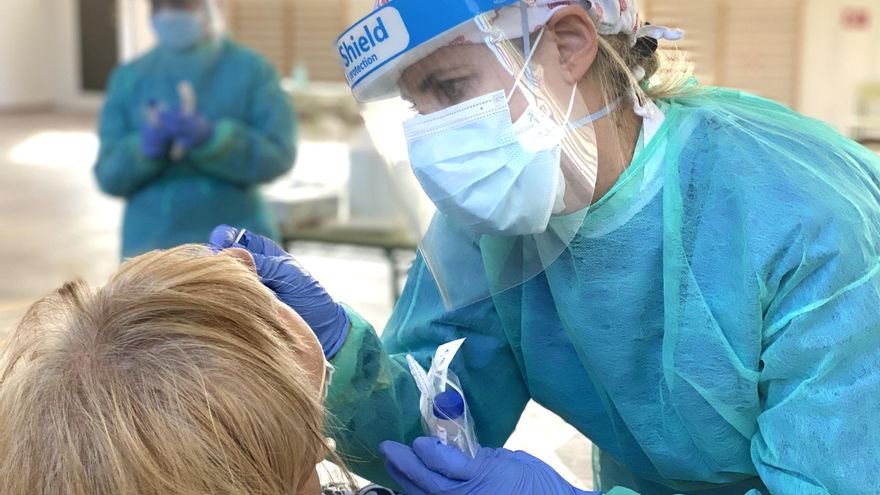
«Greater mobility and socialization». Those have been the ingredients for the Canary Islands to have beaten its own absolute record of infections in 24 hours yesterday, adding 1,207 new positives. The island that has the upper hand in this increase in cases is, by far, Tenerife, which yesterday also broke its own historical milestone by adding 792 new positives, practically double the previous day. These data have caused a real stir in the Ministry of Health, which is evaluating, together with the Directorate of Public Health, the reasons that are motivating this exorbitant growth of the sixth wave, because, in fact, it is the increase in cases more fast the coronavirus epidemic has had for the past two years.
Specifically, the Canary Islands have increased their coronavirus cases by 81% compared to the previous week, a percentage that rises to 162% in Tenerife. If last week, at the end of the December bridge, the cases of coronavirus that the Archipelago had notified during the week amounted to 2,523, this week they have already been 4,587. In Tenerife, the cases that were diagnosed from December 2 to 8 were 903; today they already amount to 2,371. The increase is also beginning to be noticed in Gran Canaria, although it is being much slower. The epidemic on the island, after adding 270 cases yesterday, grew 37% compared to the previous week, going from 1,076 weekly positives to 1,482 yesterday.
Not even in the fifth wave, the worst in terms of infections and incidence, was such a high number of positives reported. Until now the record was held by the data of July 23, when 1,023 new cases were reported. On that occasion, the cases were distributed more evenly between Tenerife (529) and Gran Canaria (391).
One of the reasons for this increase in cases is that during the December bridge there have been super-contagious events that have led to more numerous outbreaks. This is confirmed by the Ministry of Health, which recalls that last week there were only two outbreaks with more than 10 associated cases, while this week there are already eight outbreaks with more than 13 cases linked to each one of them. This week, in fact, a very similar number of outbreaks have been reported to that of the last Public Health report, but this time, the associated cases are many more. A total of 118 new outbreaks have been reported with 659 associated cases, which are distributed almost evenly between Gran Canaria and Tenerife (49 and 47 outbreaks, respectively), as well as in Fuerteventura (14), Lanzarote (4), La Palma (2) and La Gomera (2).
Super contagion events
Among the most numerous outbreaks, which exceed ten associated infected people, are that of the Tenerife nightclub, with 47 positives; one occurred in a disability care center in Gran Canaria with 32 people affected, including 14 users, two workers and the rest family members; one labor with 19 cases in Lanzarote; one sports related to soccer reported in Fuerteventura with 18 infected; a health one produced in the Hospital de La Candelaria with 16 cases (12 patients and four workers); a social one with 13 affected people in Tenerife; one with 13 infections in socially vulnerable groups in Gran Canaria, and one with 12 people involved reported in another pub in Tenerife. By area in which they have occurred, 38 are social, 35 family, 18 work, 16 educational, four sports, two health and two in socially vulnerable groups.
Of the two health outbreaks notified this week, both have occurred at the Nuestra Señora de Candelaria University Hospital, one has 16 positives (12 patients and four workers) and another affects six people, of which four are workers and the rest relatives. In addition, a social outbreak has been reported that affects HUC and La Candelaria Hospital workers, with seven cases.
The increase in cases this week has been of such caliber that even pharmacies have seen that they do not have enough to meet the demand for rapid diagnostic tests. This “excess demand” for antigen tests has meant that pharmacies have to stock up on these tests, increasing requests from suppliers. In this way, they want to avoid a “break” in the reserves, which in any case, as indicated by the pharmacists, would be solved quickly.
The increase in the demand for tests perceived by Canarian pharmacies is related both to the proximity of the Christmas holidays and to factors such as the proliferation of the omicron variant of the coronavirus, which has created alarm among the population.
162%
Increase
- Infections in Tenerife have skyrocketed, with weekly cases increasing by 162% compared to the previous 7 days. Cases this week amount to 4,587 on the island.
118
sprouts
- A total of 118 new outbreaks have been reported with 659 associated cases, which are distributed almost evenly between Gran Canaria and Tenerife (49 and 47 outbreaks, respectively).















